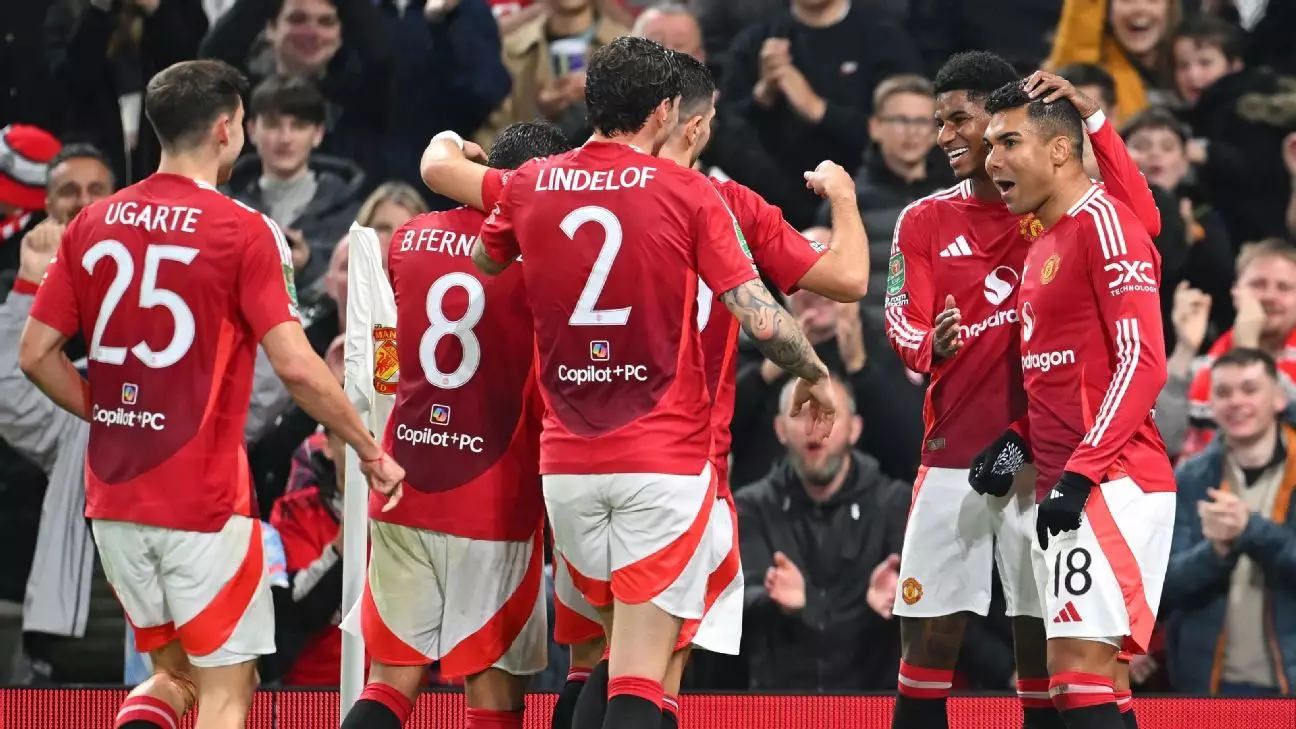The recent sacking of manager Erik ten Hag has left Manchester United in a state of flux, leading to a perplexing and somewhat exhilarating 5-2 victory over Leicester City in the Carabao Cup. This match marked a pivotal moment, not just for the team’s morale, but also for the direction in which the club is headed. Ruud van Nistelrooy, who took the helm as interim coach, led the players in a lap of honor around Old Trafford—a curious display of affection considering the squad’s struggles this season. There’s a haunting irony in this celebration; a team languishing in 14th place in the Premier League seems to grasp at any semblance of success, even if it came against a diminished opponent.
The players reveled in the applause and clearly relished this fleeting moment of joy. Van Nistelrooy’s comments about “having luck on our side” must be taken with a grain of skepticism. The win, while partially relieving, does not mask the brutal reality that the team remains a shadow of its former self. Manchester United’s enduring issues stem not just from managerial mistakes but from systemic failures within the squad.
One of the oldest narratives in football is that a team often experiences a temporary upturn in form following a managerial change—a phenomenon sometimes dubbed the “new manager bounce.” However, history shows us that this resurgence is frequently superficial. Players running on adrenaline and desperation post-sacking does not equate to a genuine transformation. Moreover, the persistent failings that led to the manager’s dismissal inevitably resurface, revealing the deeper malaise afflicting the team.
With Ten Hag’s exit, Manchester United finds itself under scrutiny, having cycled through nine managerial changes since Sir Alex Ferguson left in 2013. This alarming statistic only underscores the club’s uncertain pathway and raises serious questions about player accountability. The firing of Ten Hag was a reaction not only to tactical deficiencies but also to numerous underperforming players, many of whom still occupy the dressing room. Van Nistelrooy may find himself in the same predicament as his predecessors if he remains reliant on a group that has demonstrated inconsistent commitment and performance.
While Casemiro shined with two goals and Bruno Fernandes also made a significant impact, it is crucial to recognize the caveats accompanying this win. The defensive lapses were glaring, with Leicester City managing to exploit United’s backline multiple times. Goals from Bilal El Khannouss and Conor Coady only served to highlight ongoing weaknesses that have plagued the team—issues that Van Nistelrooy must address in his interim role.
It’s easy to become enamored with the statistics of a victory, but this match cannot be viewed as indicative of a sudden turnaround. Much of the relative success on the pitch can be attributed not only to player performance but also to Leicester’s lack of cohesion, as they fielded a less than full-strength squad. Any optimism stemming from this game must be tempered by a careful consideration of the larger implications for the team moving forward.
With Ruben Amorim poised to take the reins, the future is rife with both potential and uncertainty. United has reportedly engaged with Sporting CP to facilitate his release, but essential decisions now stand before the incoming coach. Amorim will need to weigh the capabilities of the current squad against their propensity to falter under pressure. It raises critical questions: Which players are reliable enough to trust with the demands of a revitalized system? And which individuals may be considered outdated, or perhaps, detrimental to the club’s ambitions?
No matter how entertaining this cup win was, it’s crucial for Amorim to approach his new role with a mindset shaped by realism rather than romanticism. The same players who consistently underperformed under Ten Hag are largely still present, and expecting a drastic evolution in performance based on a single match display is surely naïve.
While Manchester United could enjoy a momentary reprieve in the aftermath of this victory, the complexities surrounding the club’s situation are far from resolved. The players celebrated, perhaps a reflection of desperation for validation, yet this win does not signify anything close to stability. As the club prepares to welcome a new manager, it is imperative for all involved to focus on fostering a culture of accountability. Only then can Manchester United aspire to escape the cycle of mismanagement and reclaim its place among the elite. The fog that loomed over Old Trafford may dissipate temporarily, but the underlying issues remain shrouded, awaiting resolution.

